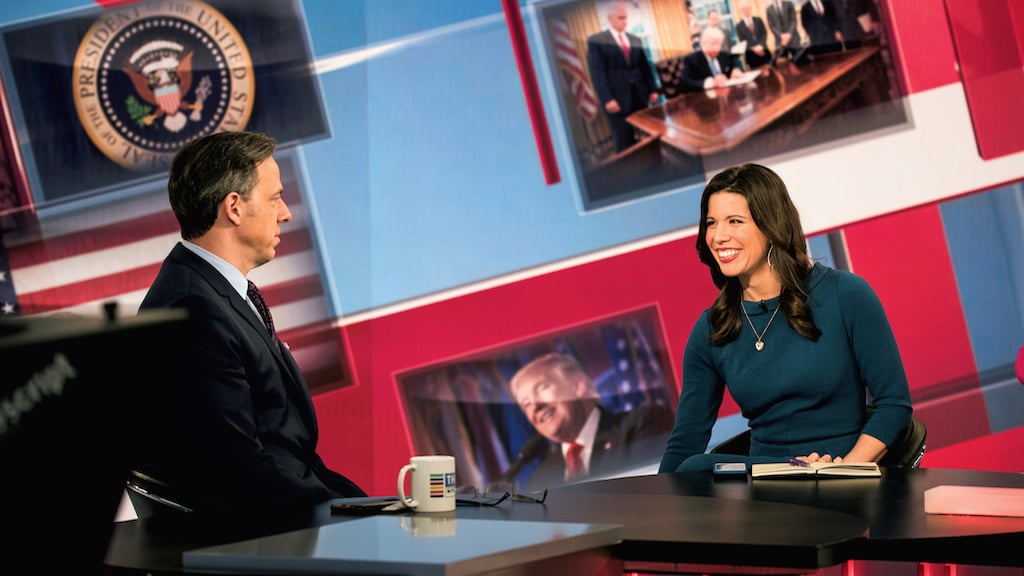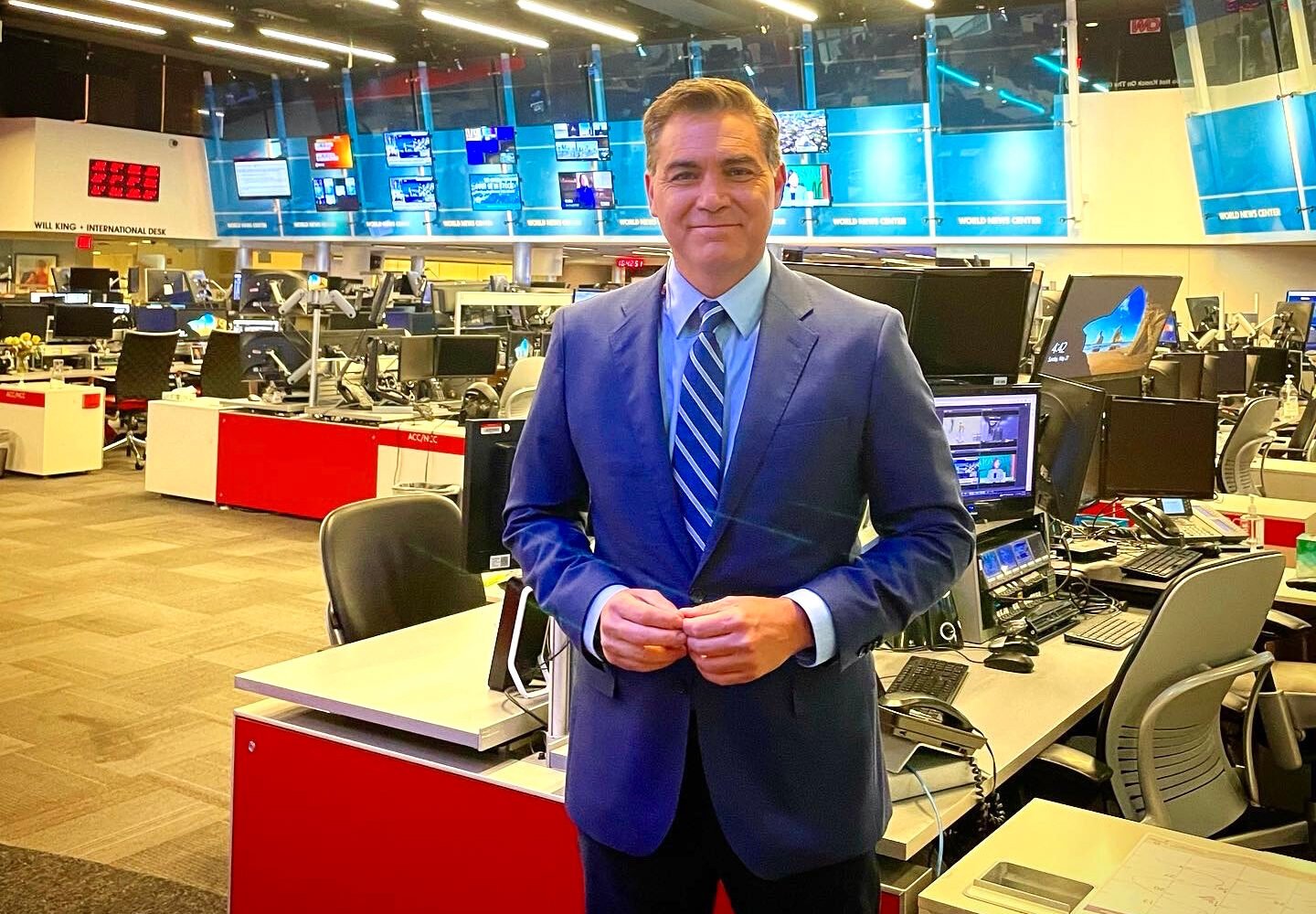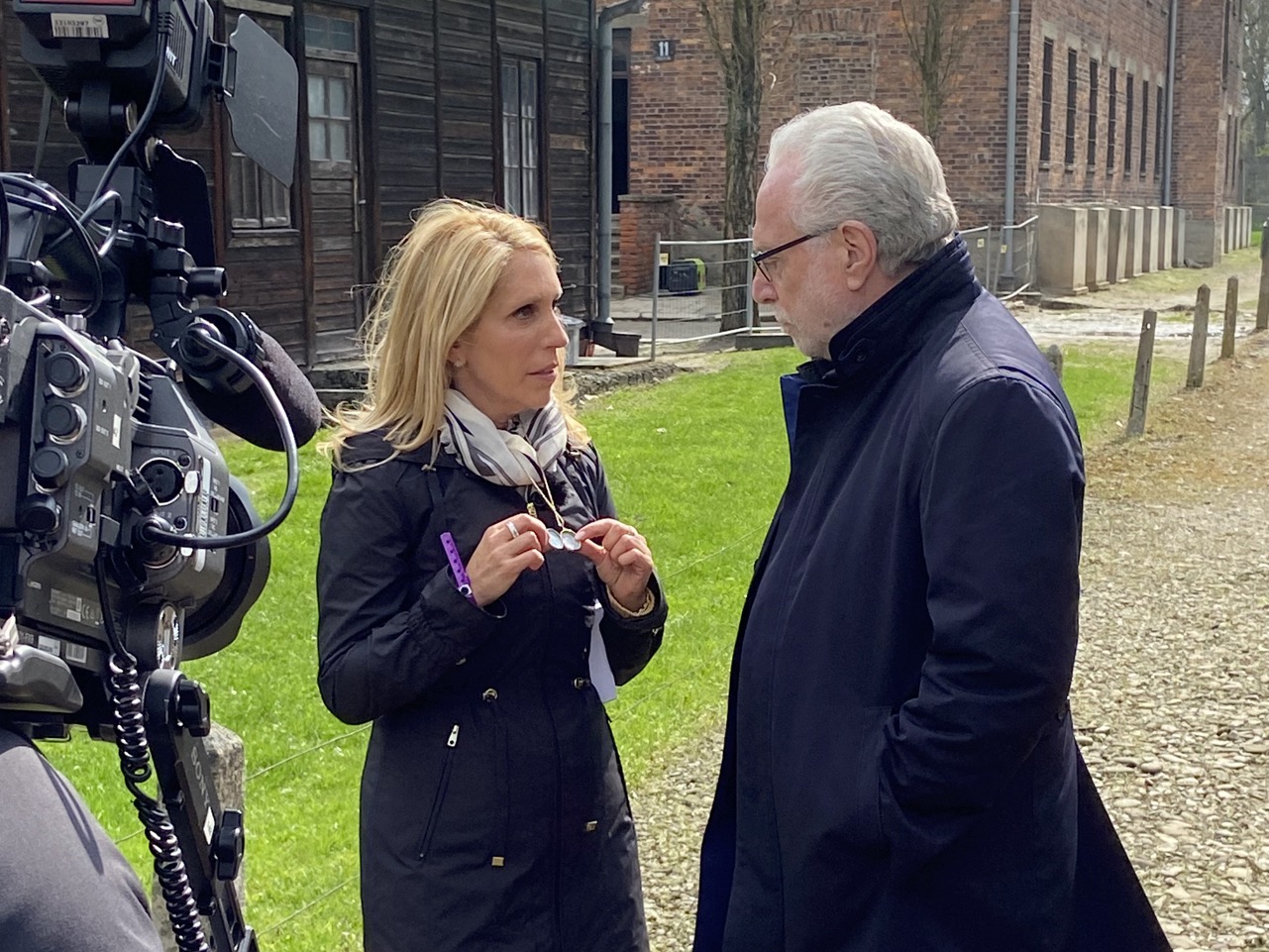On February 6, 2016, Mary Katharine Ham settled into her moderator’s chair alongside David Muir and Martha Raddatz at the ABC Republican debate in Manchester, New Hampshire. It was Ham’s first time moderating a prime-time contest, but she was hardly an unfamiliar face. She had been a conservative pundit for Fox News for eight years. She wrote pieces for Townhall, the Washington Examiner,and Hot Air. Two years earlier, she had cohosted The View.
Which is to say that she was used to the bright lights and the jewel-toned dresses and the feeling that millions of eyes were on you, watching, waiting—perhaps even hoping—for you to mess up.
This night, though, was different. It was perhaps the biggest moment of Ham’s career, and her husband, Jake Brewer, would not be watching. Jake was her political opposite—a liberal, an activist, an up-and-comer in the Obama White House—and had helped her prep for such moments, running arguments before major TV appearances, the leftie foil to her libertarian bent. But five months earlier, at age 34, Jake had died in a crash during a charity bike race. Since then, Ham had largely avoided the limelight. Now, on the verge of her reentry, his absence felt acute.
Ham knew that people were eager to see how she’d handle questioning the frontrunner, Donald Trump. Not long before, Trump had tweeted her directly after she criticized his stance toward refugees on Fox. Ham, he said, wasn’t “smart enough to know what is going on at the border.” It was potentially a setup for good television. After all, at the Fox News debate earlier in the election cycle, Trump’s exchanges with Megyn Kelly—whom he’d also attacked—had been just that.
.@mkhammer, a Fox contributor, isn't smart enough to know what is going on at the border. @TheJuanWilliams made the point far better!
— Donald J. Trump (@realDonaldTrump) November 20, 2015
When Muir tossed control of the panel her way, Ham took one deep, deliberate breath so her voice wouldn’t shake. Then she looked up, flashed a grin, and greeted the presidential candidates with the casual confidence that has charmed her fans: “Good evening, guys.”
Over the next hour, you wouldn’t have known there’d been an offstage dustup between Ham and Trump. Pressing him on the specifics of his plan to gut Obamacare, she was poised and calm, her voice measured, precise. She approached each candidate this way, persistent but never gotcha. It was an anomalous image in a cycle during which moderators often seemed more concerned than the candidates themselves about landing a blow.
“I’ve answered the question [of] who won last night’s debate,” Tucker Carlson enthused on Fox the next morning. “Unanimously, it was Mary Katharine Ham.”
That a fellow conservative would render such an assessment was expected—anyone who had observed Ham for a while had been waiting for her breakout. What was unexpected was how mutual the feeling seemed to be across networks and party lines (“Just as an aside,” CNN’s Jake Tapper tweeted, “@mkhammer is a national treasure”) and how, out of all moments in the last several years, this one would become hers.
The profile of a successful right-leaning female pundit is skewing more and more exclusively toward affected, shrill, unapologetic—and yes, blond. Ham is the opposite. The 36-year-old has asserted herself as one of the few conservative ideologues left on television, someone who’s comfortable both praising and denouncing Trump, even as the prevailing mood of hyper-partisanship almost prescribes committing to one or the other. On network TV, that practically makes her a unicorn.
“Clearly she has strong opinions, but she has the capacity to surprise you when you’re watching her,” ABC News vice president Robin Sproul says. “She’s only going up from here.”
***
The current market of conservative punditry values bombast, shock appeal. Take Tomi Lahren, the 24-year-old purveyor of meme-ready statements like “The only thing I get on my knees to do is pray.” She’s the flamethrowing host of an eponymous show on TheBlaze, where, in lieu of the Oscars, Lahren hosted “The Flakies,” for the year’s worst “snowflakes”—i.e., easily offended liberals.
Or Laura Ingraham, the radio host, Fox News personality, and once-rumored pick for White House press secretary.
They sell themselves as loyal partisans who, like the President they champion, “tell it like it is” and don’t much abide irony or self-deprecation. Bristle at one of their statements and you’ll probably get called a snowflake. They know how to entertain.
Ham would rather persuade.
From her earliest days in Washington, she’s used her sense of humor to do so. In her first job, editing a Heritage Foundation policy journal, she got attention for the funny headlines and jokes she’d tuck into write-ups about (of all things) Grover Norquist’s weekly tax meeting. By 2006, she had launched HamNation, a spoofy video blog on YouTube, a rare thing in political media at the time. In one of her most popular clips during the 2008 election, she played a Hillary Clinton staffer leading a tour of campaign headquarters. “What about allegations of planted questions at your town-hall meetings?” the visitor asked. “Plants?” Ham responded, her face hidden behind some fronds. “I don’t know anything about plants.”
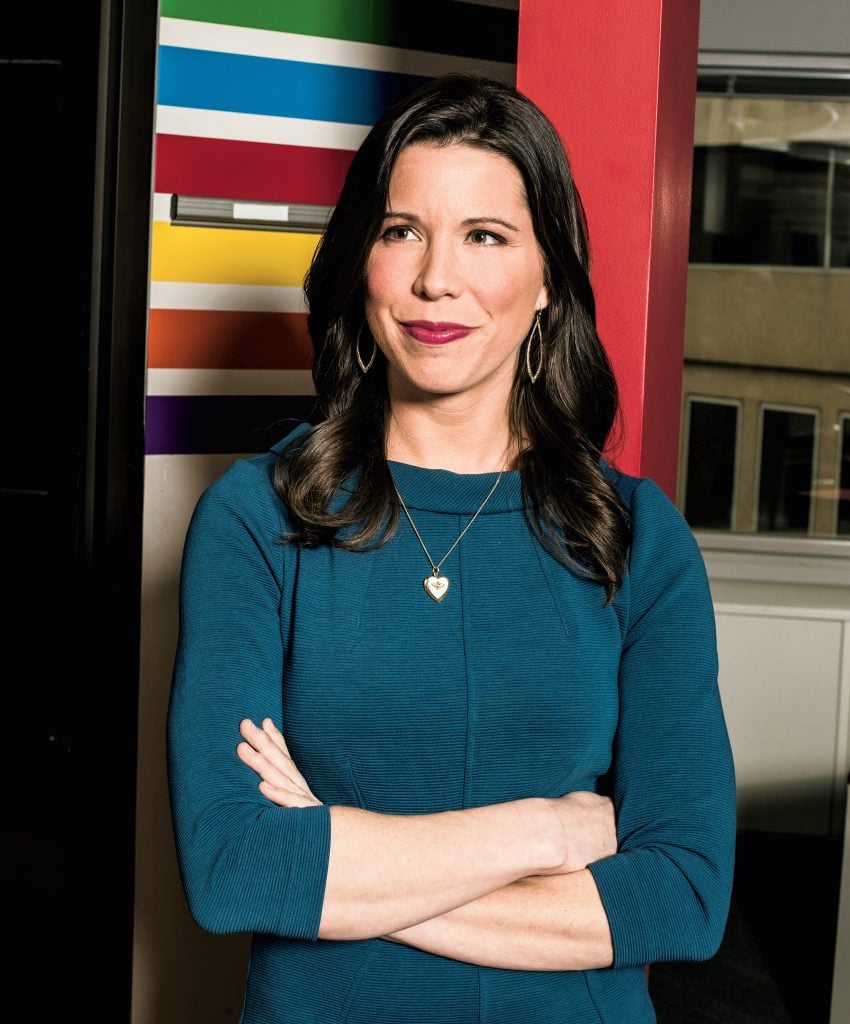
The shtick played well with fans of conservative blogger Michelle Malkin, who took Ham under her wing and provided an initial platform for her videos. But over time, Ham’s humor became less main event and more bonus scene, which endeared her to a broader audience. On June 26, 2015, she appeared on Bill Maher’s HBO show along with Hollywood director Judd Apatow, Republican pollster Kristen Soltis Anderson, and writer Michael Eric Dyson, right after Trump announced his candidacy and long before anyone took it seriously. At one point, Maher asked Ham if the West was losing the war on ISIS. “Well, I have good news,” she replied. “Trump has a plan.” The panel doubled over laughing.
Part of Ham’s appeal is her commitment to ideology over party. In regular appearances on The O’Reilly Factor (“boot camp,” she says), she’d battle with Bill O’Reilly over the legalization of marijuana, quipping that she stood in favor of it with “such radicals as William F. Buckley.” That O’Reilly would often award her ample airtime was notable, given that he’s known for never giving guests longer than a breath.
Clearly she has strong opinions, but she has the capacity to surprise you when you’re watching her. She’s only going up from here.
“It was evident to me immediately that, as they said in the old days, she eats the camera,” says radio host Hugh Hewitt, who met and started following Ham more than ten years ago. “She was someone you could see yourself having over for dinner, and that’s crucial in television.”
Ham’s colleagues appreciate her instinct to listen to others’ arguments, rather than hijack them, but that’s not to say she can’t land a punch when she chooses to. In one CNN appearance last summer, she sparred with Trump supporter Jeff Lord over Trump’s assertion that a Hispanic judge couldn’t fairly preside over the case against Trump University. Lord called the backlash among conservatives who found Trump’s comment blatantly racist an embrace of “identity politics.” Ham retorted: “I’m sorry . . . it is not some ‘leftist’ capitulation to say that saying a man cannot do his job because of his ethnicity is a problem.”
In December 2015, when Robin Sproul began looking for a conservative to help moderate ABC’s primary debate, she immediately thought of Ham. Her son-in-law, Matt Latimer—a former speechwriter for George W. Bush and now a book agent who has represented many on the right, including Ham—confirmed that “she was an independent voice and an independent thinker,” Sproul says. “That’s what we were looking for. She also brought youth and a new-media background.”
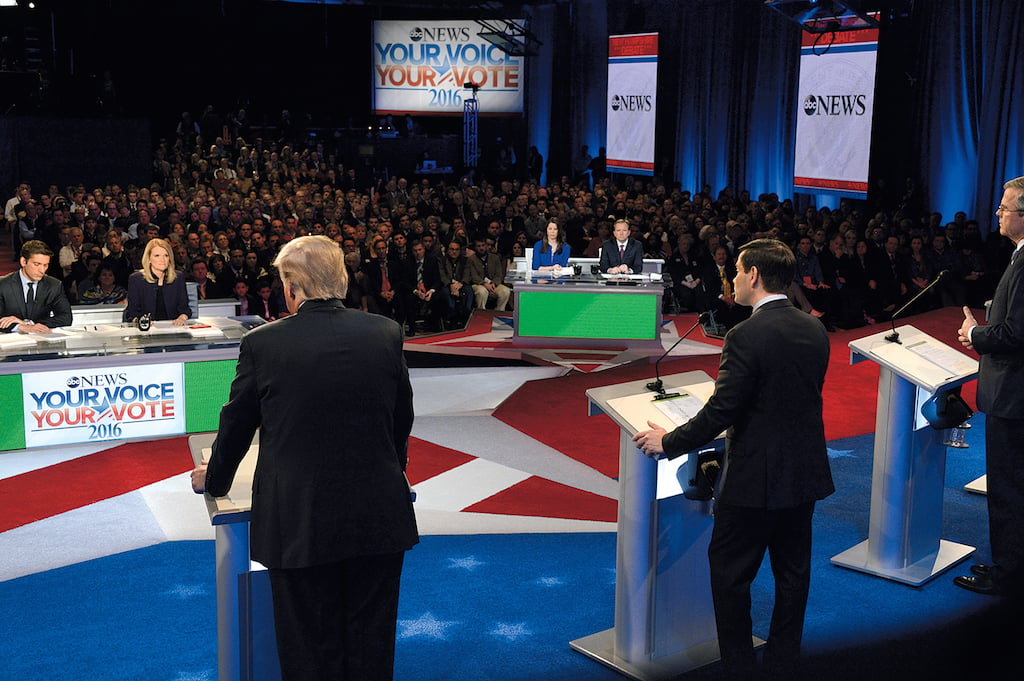
After the debate, ABC made her an offer to stay on as a contributor. Fox expressed interest in renewing her contract. When Tapper heard Ham was a free agent, he went straight to his boss, CNN president Jeff Zucker. “I said, ‘We have to get her,’ ” Tapper recalls. Within days, CNN signed her. She now appears regularly on Tapper’s show, The Lead, and on Inside Politics With John King.
A few weeks later, at CNN’s primary debate, Zucker approached Hewitt, who was helping moderate. “We got Mary Katharine,” Zucker told him. The two fist-bumped.
***
Before Mary Katharine met Jake, she had never dated a professional liberal, someone, like her, for whom politics doubled as a career. They could have played up their bipartisan relationship, Ham says—the millennial iteration of Mary Matalin and James Carville. But branding their marriage felt dishonest. Aggressive partisanship was never one of its features anyway. They tended not to bring work home, save for a periodic spat over, say, a Thomas Friedman column. (She thought Friedman had been too deferential toward China, and there was wine involved.)
Ham and Brewer had met in 2008 at a Google panel. She was speaking; he was in the audience. Afterward, he approached her and said they should get together sometime. His first e-mail—an invitation to another tech panel—went unreturned. “I always joke that the reason we got married is because I didn’t remember him,” Ham says. A year later, a friend put the two on a different panel. This time when he reached out, she replied. On their first date, they went out for Indian food, then beer at Comet Ping Pong. The night ended at 4 am.
Brewer was at the time a top staffer for Change.org and a founder of the pro-immigration group Define American. When he broke the news of his girlfriend to his mother, Lori Collins, he described Mary Katharine as “wicked funny” with a “great smile,” then started to stammer: “There’s, uh, there’s something you should know—”
“Oh, my God!” Collins shrieked. “She’s a Republican!”
Two years later, in a nonelection year, they were married on a warm April day at Lake Anna in Mineral, Virginia, where they’d put a down payment on a small house. In 2013, they had their first child, Georgia. By 2015, Ham was pregnant again. The family liked to hike and have bonfires and dress up on Halloween.

Says Ham: “We were happy.”
It was a good year for her professionally. In June, she and fellow Fox contributor Guy Benson published End of Discussion: How the Left’s Outrage Industry Shuts Down Debate, Manipulates Voters, and Makes America Less Free (and Fun). The book chronicled the rise of trigger warnings, microaggressions, safe spaces—what they called exaggerated claims of offense as a means of silencing debate. It was catnip for the Fox audience but also landed a nod in the New Yorker. Ham and Benson scored a national publicity tour.
On September 18, 2015, they were scheduled to appear in Atlanta. Ham, seven months pregnant, kissed Jake goodbye that morning in their Alexandria home. She and Benson gave their talk that afternoon, then drove to Durham, North Carolina, to stay with Ham’s parents. The next day, they caught the Duke football team playing Benson’s alma mater, Northwestern.
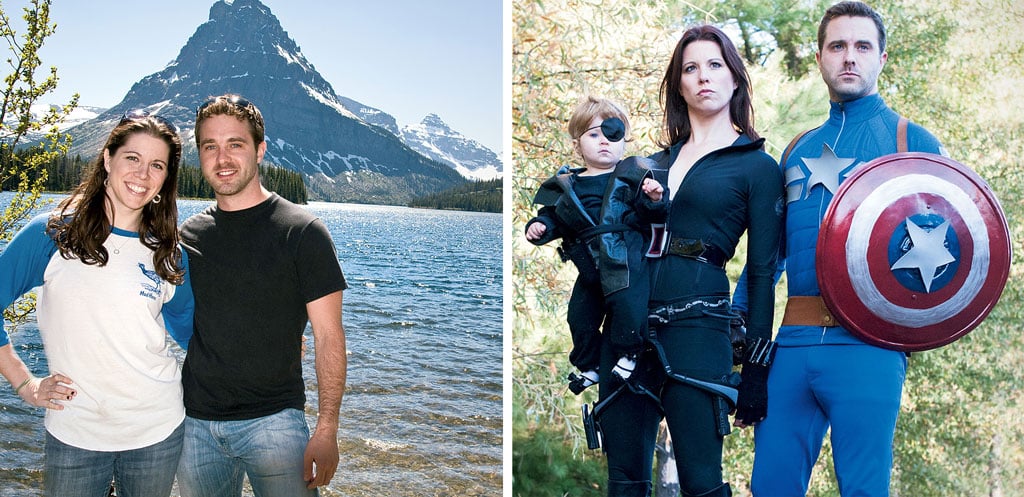
It was a Saturday, hot and clear. Ham’s phone had gone dead during the game. When it came alive back at her parents’, it began trilling with text messages. Ham turned to Benson and her parents. “There was an accident,” she said.
Little was known at that point—only that, according to Jake’s friends, a medevac had been dispatched to Howard County, where Jake had been biking. The race was two days, 160 miles, the kind of stretch he’d completed many times before.
Benson and the Hams piled into the car and started driving north to Washington. Twenty minutes later, a law-enforcement officer called with the news: Jake had been killed after losing control of his bicycle at a sharp curve and colliding with an oncoming car.
“I was completely numb,” Ham says. “I was like, ‘This is not happening. This cannot be happening.’ ”
Her father jerked the car into the nearest parking lot, a Bojangles’—Ham’s favorite. “I lost it. I said, ‘Daddy, don’t pull in here. I’m not going to associate Bojangles’ with this for the rest of my life.’ ” They settled on a Walmart, where they sat, shocked and numb, and began making calls.
The next four hours to DC were “my entire period of denial,” Ham recalls. “I thought, ‘Maybe when I get out of this car, this just will not be what happened. They’ll realize that there’s been a mistake.’ ”
When the car finally slowed in front of her mother-in-law’s home, where Georgia was staying, Ham turned to her mom and asked: “What am I supposed to do now?”
***
Brewer’s death shook insider Washington. Politicos and media types mourned him publicly over days of news stories and Twitter tributes. President Obama praised his “brilliant mind” and “big heart” and called him “one of the best.” Ham reverted to humor. The lightheartedness that defines her professional persona became the vehicle for processing her grief. “I think I’ve seen her cry maybe only three times,” says her friend Emily Dunham. “It’s just not her go-to emotion.”
Dunham helped Ham sort out the arrangements after Jake’s death. One day, they were sitting in a lawyer’s office, prepared to talk about taxes, when Ham joked under her breath that she could start pulling the “widow card” from now on. The two started giggling, Dunham says, and “the lawyer looked as us like, ‘What is wrong with you?’ ”
Benson recalls a “very bipartisan” coalition of grieving. One morning, friends and family were gathered at Ham’s when a gift basket arrived. It was stunning, he says, a rainbow of flowers. Jake’s mother, Lori Collins, gasped and picked up the card. It was from Sean Hannity.
“Ah,” Collins said. “Well, then.”
Ham, Benson says, “got a kick out of that.”
Ham was partly just being herself, but she was also trying to “choose joy” for the sake of Georgia and her sister, Garnet, to whom Ham gave birth shortly after her husband died. “Georgia knows what happened. We have talked about him ever since he died, constantly, every day,” she says. “I tell her, ‘It’s okay to be mad. It’s a raw deal.’ But he had 34 years, and lived them well, and we try to remember that, too.”
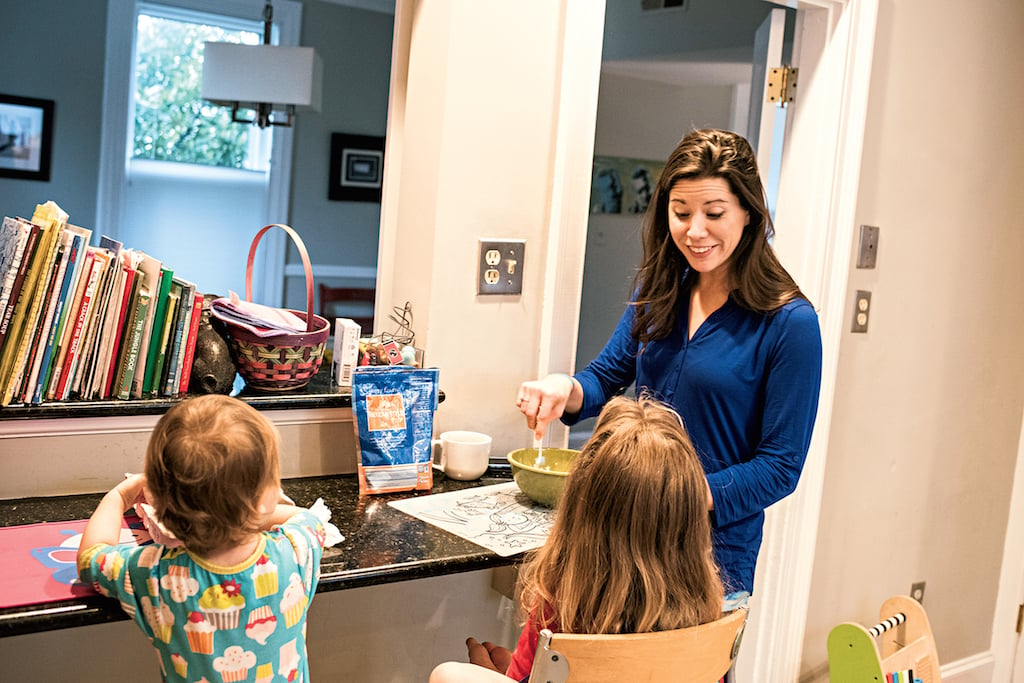
Often, though, Ham’s jokey mien created tension between her and Collins. “There were times when I just wasn’t ready for that, the humor,” Jake’s mom says quietly. “That first Christmas, she made a joke like, ‘I’m like a Hallmark movie.’ I was like, ‘You know, that’s my son.’
“I came to see that we were wired to grieve differently. She did exactly what she had to do for her girls—that was the greatest blessing of it all, ” Collins says. “I do think that their marriage was preordained. Jake wasn’t meant to be with anyone but Mary Katharine.”
For many public personalities, the impulse may have been to shut down, to hide away in a lake house outside Washington. For Ham, condolences came to be a comfort, an opportunity to tell stories about the improbable love of her life. During her first on-air appearance following Jake’s death, she told Greta Van Susteren that “he was one hell of a human being. . . . It’s how he fit in 70 years of life in 34 years.” Even in her private heartache, the girl-next-door pundit would have struggled to convince you she was anyone but herself onscreen.
***
On a cold morning in February—Valentine’s Day, as it happens—Ham drives out to Lake Anna. The house, pale yellow with a raised deck, overlooks a small cove. Docked boats line the water, today slate gray and still.
Among other chores, she has come to meet with a real-estate agent about selling the house. It’s time to unload the emotional burden of it, she says, but also the financial one—for a single mom of two, keeping a country house no longer makes much sense.
It’s barely 9 am, but she cracks open a Shock Top beer and turns on “Home” by Edward Sharpe and the Magnetic Zeros, her arrival ritual with Jake. It was a good day to escape the swamp. The White House was confronting the fallout of General Michael Flynn’s resignation as national-security adviser. “I actually think I’ve adjusted to Trump’s presidency better than a lot of people,” Ham says, sitting in a room decorated with her wedding photos. “I’d been living in weirdo land for a year before he won.”
All the same, the Trump presidency marks a tenuous moment for many conservatives—those who, while likely registered Republicans, now feel detached from the party label over things such as the White House’s pro-Russia stance. Ham says she’s still trying to figure out her role as a commentator. “It feels like you can’t really win,” she says. “You’re either accused of shilling for Trump or not being pro-Trump enough.” She does, however, criticize Republicans and others who “approach Trump like a buffet,” taking one piece of news and allowing it to confirm every bias that they have of him.
“I want to be a straight shooter about what policies I think are good, what policies I think are bad,” she says. “But I also think it’s important to remember that not every crisis has to be an 11 on a scale of 1 to 10. Right now, the media doesn’t allow anyone to figure out what the important things are. Sometimes a crisis is just a 3. That’s what I want to communicate to people.”
That sort of clarity is why Ham won’t flame out anytime soon, according to CNN president Jeff Zucker. “She’s an honest broker, and she’s got likability and confidence. Those three things give you a tremendous amount of career longevity.” He adds: “We’ve got our eye on her to perhaps sit in the seat and start asking the questions herself.”
Ham shrugs when I ask about the possibility of her own show, or whether she plans to write a second book. “My personality is such that I just kind of go with the flow,” she says. “My big goal was just to get through the last year, and I did that. The next things will just be a day at a time.”
Before we leave the lake, Ham asks me to help her load a wooden chest into her car. She and Jake bought it at an antiques store after their wedding. It had felt like a very grown-up thing to buy. Now it’s one of the few things she wants to keep from the place where they had hoped someday to move full-time.
“We’ll have a big party,” she says. She eases the trunk shut. “And then we’ll say goodbye.”
Staff writer Elaina Plott (@elainaplott on Twitter) can be reached at eplott@washingtonian.com.
This article appears in the April 2017 issue of Washingtonian.

